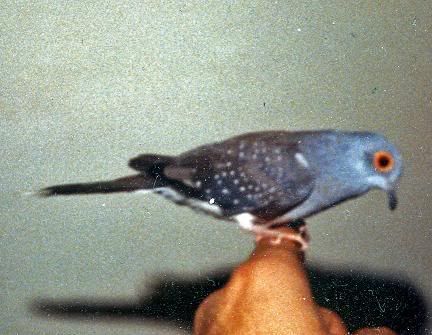This is my first dove, and first small bird at that. Just got him last night. He's eaten but shown little interest in drinking water, which I assume he will come around about eventually. It'd reassure me to hear about how everyone else's dove acted when first brought in.
Right now my concern is whenever I approach the cage and put what he needs inside, he sometimes freaks out and flies up into his cage. It's a wire cage (don't worry, I have a flat pan for the bottom) and size is just slightly above the minimum for a pair at the moment. How dangerous is this and is it normal? He of course isn't familiar with his perches yet, so he flaps right into the sides until he reaches the ground. It makes me really anxious and paranoid that he might hurt himself pretty bad. I'm pretty sure that small birds flapping all around in their cage when frightened is normal and not of too much concern especially when they're new, but aaaah I just worry so much. Right now I'm just staying on my side of the room haha.
It makes me especially worried for when I start my attempts at bonding with him in the future. I'm not sure if I can do the small room attempt right away so any tips about warming him up inside the cage?
Also, he was cooing lots earlier! He even started cooing at 4:30 in the morning. He coos in response to videos I play to help him feel like this is more of a friendly place, but he quit responding and showing interest in that a while ago. I still like to occasionally play the videos for comfort, though.
Right now he's just chilling at the bottom of his cage. He got frightened earlier and hasn't gone back up since, so I hope he does a little exploring while down there. And as I'm typing this, of course he starts to strut around and check things out!
Thanks for reading!
Right now my concern is whenever I approach the cage and put what he needs inside, he sometimes freaks out and flies up into his cage. It's a wire cage (don't worry, I have a flat pan for the bottom) and size is just slightly above the minimum for a pair at the moment. How dangerous is this and is it normal? He of course isn't familiar with his perches yet, so he flaps right into the sides until he reaches the ground. It makes me really anxious and paranoid that he might hurt himself pretty bad. I'm pretty sure that small birds flapping all around in their cage when frightened is normal and not of too much concern especially when they're new, but aaaah I just worry so much. Right now I'm just staying on my side of the room haha.
It makes me especially worried for when I start my attempts at bonding with him in the future. I'm not sure if I can do the small room attempt right away so any tips about warming him up inside the cage?
Also, he was cooing lots earlier! He even started cooing at 4:30 in the morning. He coos in response to videos I play to help him feel like this is more of a friendly place, but he quit responding and showing interest in that a while ago. I still like to occasionally play the videos for comfort, though.
Right now he's just chilling at the bottom of his cage. He got frightened earlier and hasn't gone back up since, so I hope he does a little exploring while down there. And as I'm typing this, of course he starts to strut around and check things out!
Thanks for reading!






